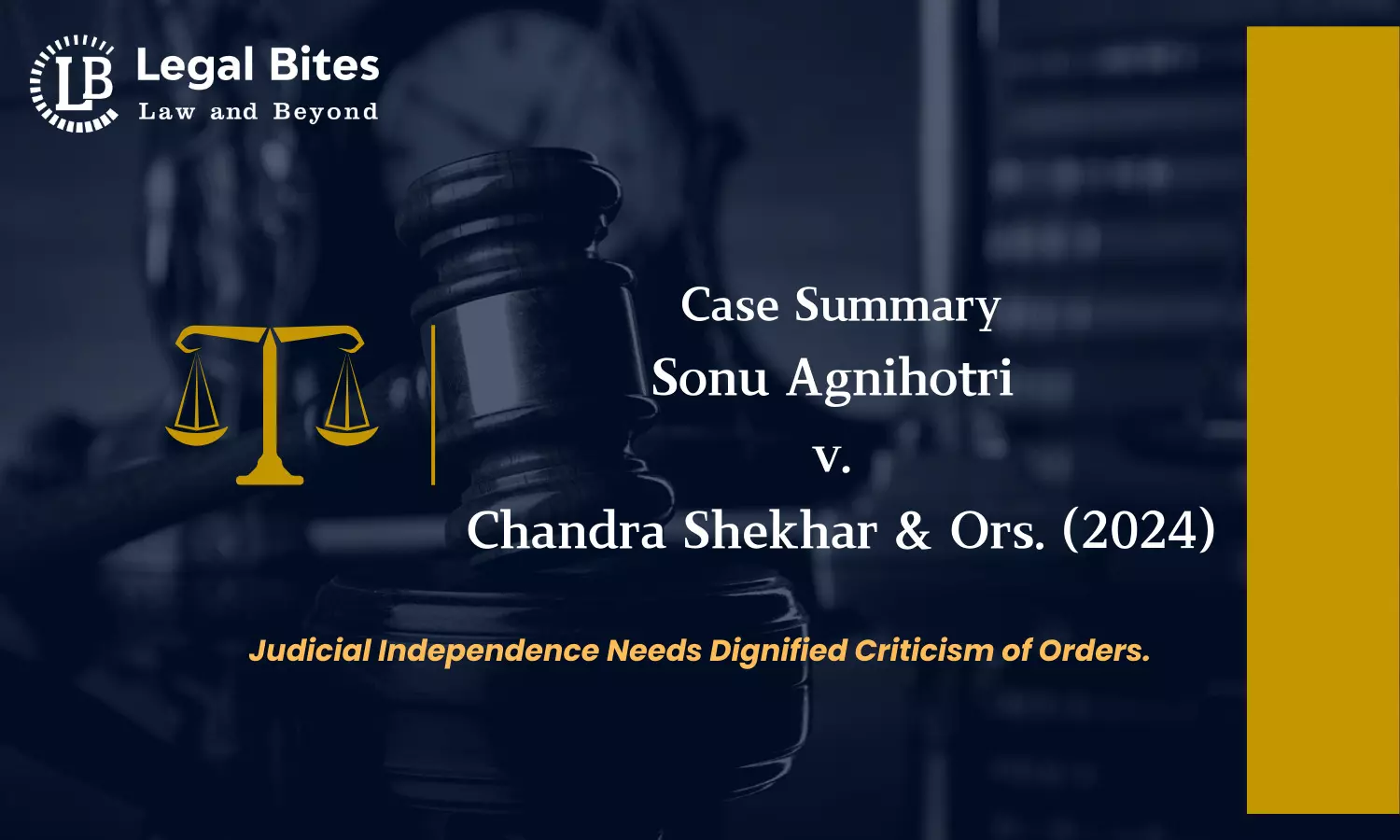Case Summary: Sonu Agnihotri v. Chandra Shekhar & Ors. (2024) | Criticising Orders Permissible, Not Judicial Officers
The Hon'ble Supreme Court allows criticism of orders but advises restraint in making personal remarks about Judicial Officers' conduct or calibre.

This appeal was filed by the appellant, Sonu Agnihotri, a serving Additional District and Sessions Judge in Delhi, challenging adverse remarks made against him in orders passed by the Delhi High Court. These remarks were recorded in the context of judicial observations and directions issued by the appellant while dealing with an anticipatory bail application. The Supreme Court, in this case, examined the propriety of such adverse remarks and the need for judicial restraint in commenting...
This appeal was filed by the appellant, Sonu Agnihotri, a serving Additional District and Sessions Judge in Delhi, challenging adverse remarks made against him in orders passed by the Delhi High Court. These remarks were recorded in the context of judicial observations and directions issued by the appellant while dealing with an anticipatory bail application.
The Supreme Court, in this case, examined the propriety of such adverse remarks and the need for judicial restraint in commenting on subordinate judicial officers.
Case Title: Sonu Agnihotri v. Chandra Shekhar & Ors.
Citation: Criminal Appeal Nos. 388-389 of 2024
Court: Supreme Court of India
Bench: Justice Abhay S. Oka, Justice Ahsanuddin Amanullah, Justice Augustine George Masih
Date of Judgment: November 22, 2024
Factual Background
Initial Case and Observations:
- The appellant, as a Sessions Judge, handled the anticipatory bail application of Vikas Gulati @ Vicky in FIR No. 221/2022 for offences under Sections 380 and 411 read with Section 34 IPC.
- The appellant observed discrepancies in the police investigation, particularly regarding the case diary entries and procedural lapses under Section 41A CrPC.
- Criticizing the conduct of the Investigating Officer (IO) and SHO, Defence Colony, the appellant issued directions for a show-cause notice under Section 177 IPC and called for a vigilance inquiry.
Subsequent Orders and Directions:
- On January 31, 2023, the appellant noted non-compliance with his directions and escalated the matter to the Commissioner of Police.
- The IO and SHO sought expunging of remarks made in the orders and quashing of directions for inquiry.
Delhi High Court’s Intervention:
- The High Court expunged the remarks made against the police officers and set aside the directions for inquiry.
- It further made adverse comments against the appellant, terming his approach as a “judicial misadventure” and advising caution in future judgments.
Issues Raised in the Appeal
- Whether the Delhi High Court was justified in making adverse remarks against the appellant.
- Whether such remarks should be expunged to protect the judicial independence and dignity of subordinate judicial officers.
Submissions
For the Appellant:
- The appellant acted within his jurisdiction to question police conduct, highlight procedural lapses, and issue directions for compliance.
- The High Court’s remarks in paragraphs 13 and 14 were unwarranted and adversely affected the appellant’s unblemished judicial career.
- The appellant relied on precedents emphasizing judicial restraint and the proper avenue for addressing concerns about subordinate judicial officers (e.g., Re: ‘K’, A Judicial Officer).
For the Respondents (State):
- State emphasized the need for restraint in judicial pronouncements, particularly in criticizing public servants and judicial officers.
- It cited precedents underlining the importance of addressing such issues through administrative mechanisms rather than judicial observations.
Key Judicial Findings
Role of Subordinate Judiciary:
Reiterating the principle laid down in State of U.P. v. Mohd. Naim (1963), the Court emphasized that judicial remarks must adhere to fairness, restraint, and relevance to the case.
Unwarranted Remarks:
Criticism of a judicial officer should be avoided unless it is essential for the decision. Adverse remarks made without allowing the officer to violate principles of natural justice.
Judicial Independence and Dignity:
The High Court’s remarks in paragraphs 13 and 14 of its order were deemed unnecessary and prejudicial. The term “judicial misadventure” was held to be inappropriate.
Administrative Oversight:
Any concerns regarding the conduct of a judicial officer should be addressed administratively, not through judicial pronouncements.
Judgment
Appeal Allowed. The Supreme Court expunged the adverse remarks made against the appellant in paragraphs 13 and 14 of the High Court’s order.
The directions issued by the High Court advising caution to the appellant were also set aside.
Observations on Judicial Restraint:
The Court underscored the importance of maintaining judicial independence and dignity, especially when dealing with subordinate judiciary.
Criticism, if necessary, should be addressed administratively through confidential channels.
Conclusion
The Supreme Court’s decision serves as a reminder of the need for judicial decorum and restraint in commenting on subordinate judicial officers. It reinforces the principle that judicial independence must be safeguarded from unwarranted criticism while ensuring accountability through proper administrative channels. Criticising orders is acceptable, but criticism of the officer should be avoided.
Important Link

Apurva Neel
I am a Research Associate and Editor at Legal Bites with an LL.M. specialization in Corporate and Commercial Laws from Amity University, Mumbai. I have put my best efforts into presenting socio-legal aspects of society through various seminars, conferences etc. I keep refining content as I am an ardent writer, and palpably law has got multi-dimensional aspect, so I passionately try to explore ahead.
